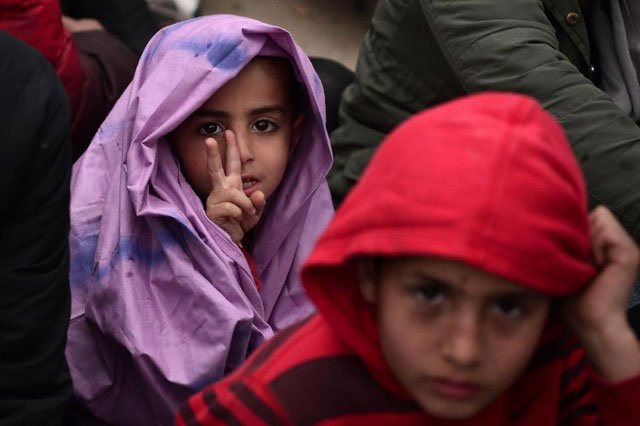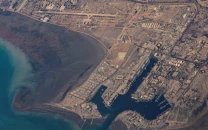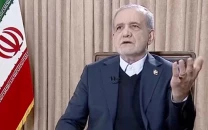EU pushes back Turkey migrant deal until summit next week
Turkey is the main launching point for migrants making the dangerous crossing over the Aegean Sea to the Greek islands

PHOTO: AFP
Turkish Prime Minister Ahmet Davutoglu stunned his counterparts by demanding an extra three billion euros ($3.3 billion) in aid in exchange for his country's help to counter the continent's biggest migration crisis since World War II.
EU to push Turkey to take back migrants on 'large-scale'
He also proposed a refugee swap under which the EU would resettle one Syrian refugee from Turkey in exchange for every Syrian that Turkey takes back from the overstretched Greek islands, a move that rights groups say would be illegal.
Davutoglu further demanded that the 28-nation bloc would also bring forward visa-free travel for Turks to June, and speed up the country's long-stalled EU membership bid.
After extending the meeting into the early hours of Tuesday to ponder the cost of Turkey's help, the EU leaders said they backed the proposal in principle but would need until the next scheduled European summit next week to deal with the controversial proposals.
"President of #EUCO (Donald Tusk) will take forward the proposals and work out the details with the Turkish Side before the March #EUCO," Luxembourg Prime Minister Xavier Bettel said in a tweet, referring to the European Council summit.
The next summit will now take place on March 17-18, with the pressure on Europe to reach a deal that will stem a crisis that has seen more than a million refugees and migrants flood its shores since it began more than a year ago.
'Breakthrough with Turkey'
Turkey is the main launching point for migrants making the dangerous crossing over the Aegean Sea to the Greek islands.
European Commission chief Jean-Claude Juncker's top aide Martyn Selmayr tweeted: "Breakthrough with Turkey. And clear commitment to go back to Schengen by the end of the year."
18 dead as migrant boat sinks off Turkey
Juncker has expressed fears that a series of border closures to stop migrants entering Europe has endangered the passport-free Schengen zone, which is seen as a pillar of unity and freedom in the post-war European project.
But securing a deal may be difficult given the deep divisions that the migration crisis has sown in the bloc.
Hungary's hardline anti-migration Prime Minister Viktor Orban "has vetoed (the) EU-Turkey plan to relocate asylum seekers directly from Turkey", his spokesman tweeted.
Italian Prime Minister Matteo Renzi was threatening to veto any deal unless the final statement carried a reference to Turkey's recent crackdown on the main newspaper opposed to Turkish President Recep Tayyip Erdogan.
Turkey has proved a difficult partner for the EU despite the fact that the two signed a deal in November under which Ankara agreed to stem the flow of migrants in exchange for an initial three billion euros in aid.
Erdogan -- who has previously threatened to "flood" the EU with migrants -- on Monday criticised the EU for a four-month delay in disbursing the funds from the November deal.
"With this new proposal our objective is to rescue the lives of the refugees, to discourage those who want to misuse and exploit the desperate situation of the refugees, meaning human smugglers, and to have a new era in EU Turkey relations," he said.
'Explosive' demands
But the "explosive" Turkish demands left the summit in disarray, European sources said.
"It poses huge legal and logistical questions," one source told AFP.
Despite efforts by Tusk to find consensus last week on a tour to Greece, the Balkans and Turkey, the EU was still struggling with other divisions at the summit.
Iran and Turkey aim to triple trade to $30 billion
A row broke out over plans to include in the summit's conclusions a mention of the closure of the main migrant route through the Western Balkans -- the path from Greece to wealthy Germany and Scandinavia in the north.
German Chancellor Angela Merkel -- facing pressure at home and abroad over her open-door asylum policy -- and Juncker both opposed it for fear that it would encourage further unilateral border closures by EU states.
They fear a repeat of when Austria last month abruptly capped the number of asylum seekers it would accept, triggering a domino effect of border restrictions along the Balkans that has trapped tens of thousands of desperate migrants on the border between Greece and non-EU Macedonia.






1721969212-0/BeFunky-collage]-(35)1721969212-0-208x130.webp)












COMMENTS
Comments are moderated and generally will be posted if they are on-topic and not abusive.
For more information, please see our Comments FAQ